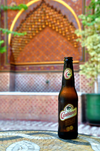Could nuclear energy one day power the Maghreb?
The Maghreb’s energy transition is a complex but critical journey towards sustainability and decarbonization as countries aim to meet

Morocco saw a decline in beer production in 2024, with output falling by approximately 17,000 hectoliters compared to the previous year. The drop places the country behind regional peers Tunisia, Algeria, and Egypt, according to Moroccan media citing data from global hop supplier BarthHaas.
Beer was first introduced to Morocco in the early 20th century during the period of French colonial rule, when it was primarily consumed by European visitors and served in hotels. Today, alcohol is legally sold in hotels, bars, supermarkets, and liquor stores, but its sale to Muslims is officially prohibited under Moroccan law.
Enforcing the ban, however, remains challenging. Vendors are held legally responsible if they sell alcohol to Muslims, but they are not permitted to ask about a customer’s religion. As a workaround, many shopkeepers reportedly avoid issuing receipts to Moroccan buyers in order to sidestep potential scrutiny.
Despite these restrictions, alcohol consumption remains significant in the country. Moroccans consume around 131 million liters of alcohol annually, according to the World Health Organization. Beer remains the most popular alcoholic beverage, accounting for 44% of total consumption. Wine follows at 36%, with the remaining 20% spread across spirits and other alcoholic drinks.
Local beer brands such as Spéciale Flag, Stork, and Casablanca remain popular, with some exported internationally. Meanwhile, Heineken—which was once brewed domestically—is now imported and holds the title of best-selling international beer in Morocco.
The country’s production slump contrasts with a broader 6.7% increase in beer production across Africa in 2024, driven primarily by growth in South Africa, Angola, and Ethiopia.
Sign up for the weekly newsletter and get our latest stories delivered straight to your inbox.